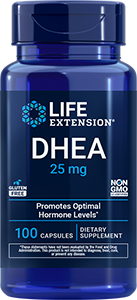
What are DHEA Supplements? A Beginner’s Guide
Published: June 2022 | Updated: June 2025
We all have at least one thing in common: We're aging every day. And with that comes certain changes. Maybe your memory isn't as sharp, your muscles not as strong, and some of the—*ahem*—spark is gone from your romantic relationships. Are we all merely victims of Father Time, or is there something we can do about it?
Enter: DHEA for healthy aging. Let's talk about what it is, what benefits it can offer, and if it might be a good supplement for you.
DHEA supplements: What are they?
Dehydroepiandrosterone, or DHEA, is a hormone. Along with dehydroepiandrosterone's sulfated form—DHEA sulfate (dehydroepiandrosterone sulfate)—it's the most abundant steroid hormone in the body. It's also a precursor to two other hormones you're likely familiar with: estrogen and testosterone, the sex hormones. All the hormones combined control many of your body's very important functions and systems.
Dehydroepiandrosterone supplements are made from wild yams. Often, a supplement will provide 50 mg of DHEA per serving. These supplements are used to keep your hormone levels optimized as you age, although that's not dehydroepiandrosterone's only application.
Where is DHEA found: natural or synthetic?
Your body is already producing dehydroepiandrosterone in your adrenal glands. Men also produce more in their testes and women in their ovaries. Plus, science tells us that your brain makes DHEA as well.
While wild yams and soybeans are natural sources of the starting material for dehydroepiandrosterone, the specific process to create DHEA takes place in a scientific laboratory. Special techniques are used to confirm that the molecules in the supplement are identical to the DHEA that your body is already producing.
How do DHEA supplements work?
As we age, our hormone levels can decrease. This happens with estrogen, testosterone, and—you guessed it—dehydroepiandrosterone. Fortunately, you can use DHEA supplementation to counter age-related decreases in the hormone. This is especially important considering that dehydroepiandrosterone is the most abundant steroid hormone in the body. So, maintaining appropriate levels is important for your overall health. Furthermore, some of your DHEA converts to estrogen and testosterone. So there's some overlap between the three hormones.
Women may read this and think, "Well, I don't want to supplement with DHEA, then!" And we hear you. After all, as an androgen, testosterone helps to maintain male characteristics. But even though the ladies produce a lot less testosterone than men, you still need some. In particular, testosterone is important for maintaining a healthy libido. Plus, it plays a role in bone and brain health. So, women do need testosterone, and dehydroepiandrosterone can help.
DHEA supplements: 5 health benefits
Many double-blind, placebo-controlled trials have shown the benefits of dehydroepiandrosterone supplementation. This is important because declining DHEA levels as we age can play a part in age-related physical changes. Thus, older men and postmenopausal women stand to benefit greatly by adding dehydroepiandrosterone to their routines.
Much of the research on dehydroepiandrosterone supplementation has focused on how it can help us stay healthy as we age. So, how exactly does DHEA fight back against the ravages of time? Let's count the ways!
Good to the bones.
For postmenopausal women, loss of bone mineral density is common. Supplementing with dehydroepiandrosterone can help keep your bones strong, even as you age.A muscle strength and muscle mass must-have.
No, DHEA can't make up for skipping the gym, but this dietary supplement promotes healthy muscle strength, and it can support those "gains" when coupled with weight training. Muscle mass is also important when it comes to healthy aging. Dehydroepiandrosterone helps you increase lean muscle mass when combined with regular resistance exercise.Hormone balance.
Remember, some of your DHEA converts to estrogen and testosterone in your body. Supplementation with dehydroepiandrosterone has been shown to help maintain a healthy hormone balance.Support for sexual function.
One of the worst parts about aging is the change in our sex lives. DHEA to the rescue! This supplement supports healthy sexual function for both sexes.Brain health benefits.
Worried about those "senior moments"? Consider supplementing with DHEA to support memory and cognitive function. (Interesting sidenote: DHEA isn't the only hormone that can be taken as a dietary supplement to support your noggin! Pregnenolone is a precursor to DHEA and is often also used as a supplement to support brain health and function.)
One quick caveat: It's important to consider other foundational supplements in addition to dehydroepiandrosterone, though, to holistically support your overall health and well-being.
Explore Our Best DHEA Supplements
Who needs DHEA supplements?
After age 25, you might consider testing your dehydroepiandrosterone levels because they may start declining at this point. Maintaining healthy DHEA levels has whole-body benefits, so follow your DHEA levels yearly. Testing should continue after you start supplementing, as well. DHEA serum blood tests are suggested 3 to 6 weeks after beginning supplementation to optimize individual dosing.
Do DHEA supplements have side effects?
Dehydroepiandrosterone is a naturally occurring hormone (just like estrogen and testosterone). However, you should only supplement with it under the guidance of a healthcare provider. Be sure to have your DHEA levels tested about three to six weeks after you begin supplementing. Your DHEA dosage might be unique to you and your health goals.
DHEA dosage recommendations
Clinical trials have found support for DHEA's health benefits at doses of 50 mg or more daily. At those doses, DHEA helps to promote hormone balance, bone health, muscle mass and strength, sexual function, memory and cognitive function. But your specific dosage should be determined by blood testing and the advice of a healthcare professional.
When should I take DHEA supplements?
It's ideal to take your DHEA supplement in the morning when the levels in the human body are naturally at their highest. If you divide your doses, supplementing before breakfast and again before lunch is recommended.
Should DHEA supplements be taken with food?
Dehydroepiandrosterone is usually taken without food, although it's safe to consume with food if this helps you remember. What matters most is that you're consistent with your DHEA dosage.
How long do you have to take DHEA before it works?
The DHEA levels in your body respond fairly rapidly to supplementation, so you should test your DHEA levels about three to six weeks after you begin supplementing. Research supports supplementing for at least two months before looking for any other significant changes.
We can't completely control what our bodies do as they age. But we can offer them extra support through the food and supplements we consume. Talk to your doctor to see if DHEA might be a good addition to your lifestyle.
Want to know which nutrients may be right for you? Take our hormone health quiz and get a recommendation tailored to your health concerns.
Resources
- Bloch M, et al. "The use of dehydroepiandrosterone in the treatment of hypoactive sexual desire disorder: A report of gender differences." European Neuropsychopharmacology. August 2013. https://www.sciencedirect.com/science/article/abs/pii/S0924977X12002684
- Boxer RS, et al. "Effects of dehydroepiandrosterone (DHEA) on cardiovascular risk factors in older women with frailty characteristics." Age Ageing. July 2010. https://pubmed.ncbi.nlm.nih.gov/20484057/
- Hackbert L, Heiman JR. "Acute Dehydroepiandrosterone (DHEA) Effects on Sexual Arousal in Postmenopausal Women." Journal of Women's Health & Gender Based Medicine. July 2004. https://www.liebertpub.com/doi/abs/10.1089/152460902753645290
- Jankowski CM, et al. "Effects of Dehydroepiandrosterone Replacement Therapy on Bone Mineral Density in Older Adults: A Randomized, Controlled Trial." JCEM, August 2006. https://academic.oup.com/jcem/article/91/8/2986/2656474
- Mandal S, et al. "DHEA on Sexual Function in Sheehan Syndrome: A Randomized Double-Blind Placebo-Controlled Crossover Trial." J Clin Endocrinol Metab. July 2022. https://pubmed.ncbi.nlm.nih.gov/35481572/
- Merritt P, et al. "Administration of dehydroepiandrosterone (DHEA) increases serum levels of androgens and estrogens but does not enhance short-term memory in post-menopausal women." Brain Res. November 2012. https://pubmed.ncbi.nlm.nih.gov/22985672/
- Stangl B, et al. "Administration of dehydroepiandrosterone (DHEA) enhances visual-spatial performance in postmenopausal women." Behav Neurosci. October 2011. https://pubmed.ncbi.nlm.nih.gov/21942436/
- Tang J, et al. "The Utilization of Dehydroepiandrosterone as a Sexual Hormone Precursor in Premenopausal and Postmenopausal Women: An Overview." Pharmaceuticals (Basel). December 2021. https://pubmed.ncbi.nlm.nih.gov/35056103/
- Villareal DT, Holloszy JO. "DHEA enhances effects of weight training on muscle mass and strength in elderly women and men." American Journal of Physiology. November 2006. https://journals.physiology.org/doi/full/10.1152/ajpendo.00100.2006
- Weiss EP, et al. "Dehydroepiandrosterone replacement therapy in older adults: 1- and 2-y effects on bone." Am J Clin Nutr. May 2009. https://pubmed.ncbi.nlm.nih.gov/19321570/
Like what you read?
Please subscribe to get email updates on this blog.









